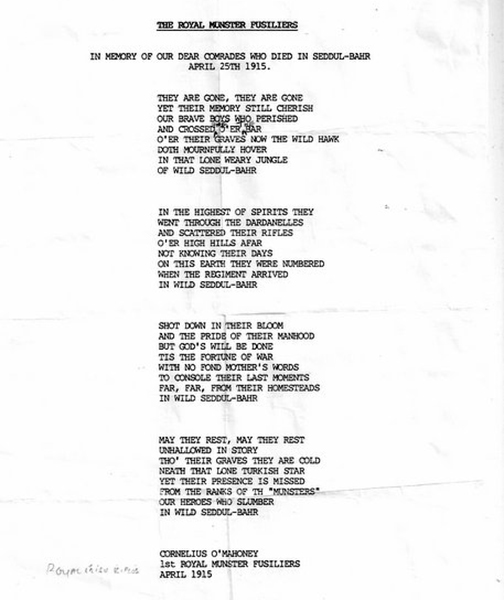A MOVING poem written by an Irish soldier during World War One has been unearthed in an attic in Britain over a century on.
Peter ‘Derry’ McCarron was clearing the house of his late mother in Kendal, Cumbria when he discovered the poem within a stack of old documents.
The verses were written by his great-uncle Cornelius O’Mahoney, who was born at 40 Shannon St (now Oliver Plunkett St) in Bandon, Co. Cork in 1889.
Cornelius was 26 when he fought in the Dardanelles, Turkey in 1915 for the 1st Royal Munster Fusiliers – who lost over a third of their regiment during the Great War.
His beautiful poem – titled simply ‘The Royal Munster Fusiliers’ – was dedicated to the “memory of our dear comrades who died in Seddul-Bahr, April 25 1915.” It reads:
'They are gone, they are gone
Yet their memory shall cherish
Our brave boys who perished
And crossed over the bar
O’er their graves now the wild hawk
Doth mournfully hover
In that lone weary jungle
Of wild Seddul-Bahr
In the highest of spirits they
Went through the Dardanelles
And scattered their rifles
O'er the hills afar
Not knowing their days
On this Earth they were numbered
When the regiment arrived
In wild Seddul-Bahr
Shot down in their gloom
And the pride of their manhood
But God’s will be done
’Tis the fortune of war
With no fond mother’s words
To console their last moments
Far, far from their homesteads
In wild Seddul-Bahr.
May they rest, may they rest
Unhallowed in story
Tho’ their graves they are cold
Neath that lone Turkish star
Yet their presence is missed
From the ranks of the Munsters
Our heroes who slumber
In wild Seddul-Bahr.'
Following the Royal Munster Fusiliers’ disastrous campaign in the Dardanelles, Cornelius O’Mahoney’s unit was redeployed to the Western Front after a humiliating retreat.
“It was a case of out of the frying pan and into the fire,” Derry, who was delighted to discover his great-uncle’s moving stanzas so many years on, told The Irish Post.
“Cornelius thankfully survived the Western Front and most of his family went to England after the war."
 Following the Irish War of Indepencence, the Irish Civil War and establishment of the independent Irish Free State in 1922, The Royal Munster Fusiliers were disbanded.
Following the Irish War of Indepencence, the Irish Civil War and establishment of the independent Irish Free State in 1922, The Royal Munster Fusiliers were disbanded.
On June 12 of that year, five regimental Colours were laid up in a ceremony at St George's Hall, Windsor Castle in the presence of HM King George V.
Nevertheless, the regiment chose to have its standard remain in St. Patrick's Cathedral, Dublin.
The Royal Munsters won three Victoria Crosses in total during the Great War.
“Cornelius died in Shanakiel, Co. Cork in the late 1950s. His youngest son John Joe stayed in Bandon and died only around 15 years ago," Derry said.
He added: “I found his poem among old documents when we cleared my mother’s house in Cumbria. It was a beautiful surprise.”
Derry kindly provided The Irish Post with a picture of a young Cornelius with his mother, two brothers, and two sisters taken almost a century ago.
The photograph was taken at Cornelius' home at 40 Shannon Street in Bandon after his return from the war.
It shows the O’Mahoney family posing for the camera in front of their humble Co. Cork home – their graceful mother sat wearing a smile, exuding pride.

